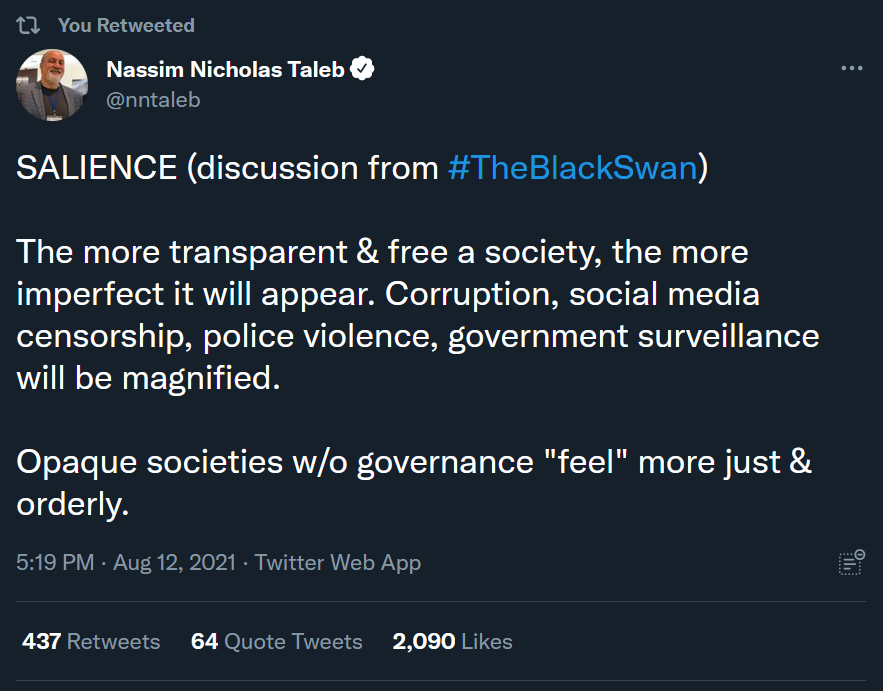Hello Everyone
Welcome to Weekly Wisdom, your weekly dose of highlights, quotes and notes from my notebook. If you would like to receive this in your inbox, subscribe now.
Hello to all the Subscribers, new and old!
Last week’s newsletter was the most successful yet. Thank you. This week I would like to share:
- A Primer on The Right to Free Speech: Freedom of Speech is the most ‘popular’ civil liberties. It is also oft-confused.
On to the main event.
This week’s quotes
Salience
The only real ‘public intellectual’, Nassim Taleb, drops more knowledge in his twitter feed per week than some tenured professors do in their whole career. You can’t find a better summary of this idea.

How to Clear Urban Congestion
The Patron Saint of Hackerpunks, Cory Doctorow, writes about Managing Aggregate Demand, in terms of Theme Park queues. But this passage explains why mass-transit is the only way to solve Urban Traffic Congestion.
Here’s the thing: no matter how many lanes they add to the interstate, traffic will still be terrible, for two reasons: first, because adding more capacity induces more people to use the roads, and second, because the wider the road gets, the more living and working space it occupies, and the further apart everything gets, and the more people need to drive to get to where they need to be.
Despite what geometrically illiterate billionaires would have you believe, reality has a well-known bias in favor of public transit. Putting more cars on the road makes cars worse. You can’t solve that with tunnels, nor with self-driving cars. You can’t even solve it by adding bike lanes (bikes substitute for transit journeys, not car trips). Multiply the number of people by the number of miles and divide it by the area of the city and you’ll quickly see that mass transit is literally the only way to clear congestion. Period.
—Cory Doctorow, Managing aggregate demand (Part IV)[Audio and Text]
Also recommended, this hilarious take-down of the Elon Musk loop idea:
Power & Vanity
Robin Hanson, writing for Overcoming Bias. The essay is about how prestige is the most important factor in hiring. Especially for high-paying companies. Your abilities and qualifications are irrelevant. Your value is in the prestige you can bring to the organization. In the form of credentials and decadent extra-curriculars.
Yet for extracurriculars, you are not supposed to connect those to your career plans, as “nerds” do. You must instead do something with no practical value, but that is prestigious. Like varsity athletes in lacrosse or crew, sports that are too expensive for ordinary folks to pursue. Excess interest in ideas marks you as a “boring” “tool”.
—Robin Hanson, Prestige in US Today
Tattle-punk
Apple, which has spent the past half-decade or so marketing its Privacy credentials, recently announced plans to scan customers data. Now the reason they give is to prevent child abuse. It is a commendable goal and I do not doubt their intentions. However, I also do know what they say about the Road to Hell.
While there are reasons to be skeptical of Apple’s claims, for the purposes of this article let’s assume that Apple’s client-side scanner does only what it says it does, how it says it does it, and it will never expand into other areas. Even if this is the case, Apple’s move now legitimizes client-side scanning. After all, if Apple can do it, a company that markets itself as caring about privacy, it must be OK from a privacy perspective for other companies to follow suit with their own client-side scanners.
…
As the scope of scan-worthy crimes expands, so do Internet of Snitches capabilities. Streaming media services would be motivated to search for DMCA violations on your devices. Your car could report when you parked illegally or disobeyed the speed limit (there are already proposals to mandate new cars scan you for impairment or for children left in the car). Your smart irrigation system could detect whenever you watered your lawn in violation of water conservation orders. Your home security system or smart doorbell could expand what data sharing it already does with law enforcement.
—Kyle Rankins, The Internet of Snitches
Thank you for joining me this week. If you know some who might enjoy this, please forward this email to them. See you next week.
Mudassir Chapra
